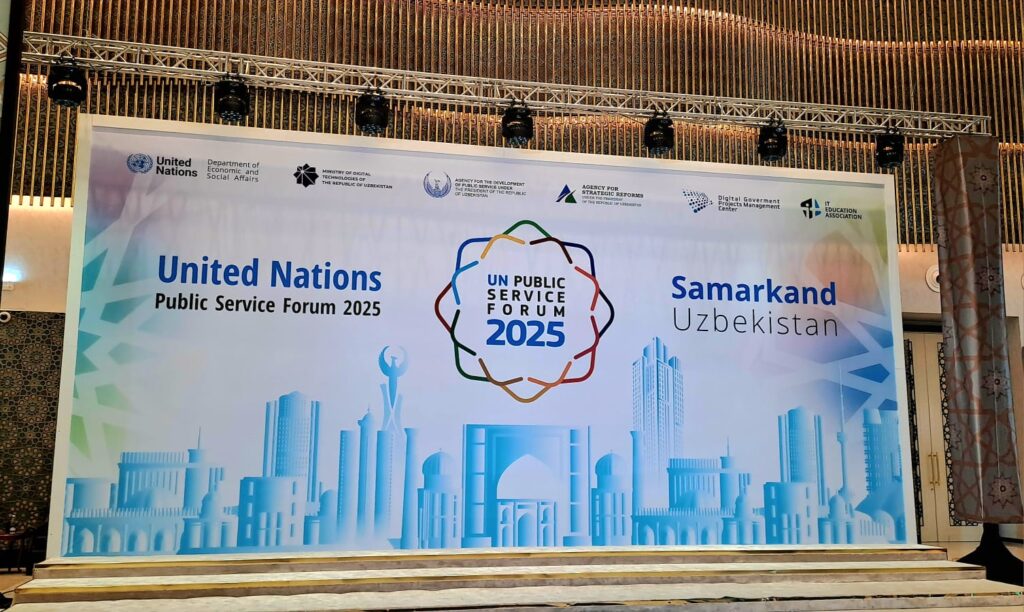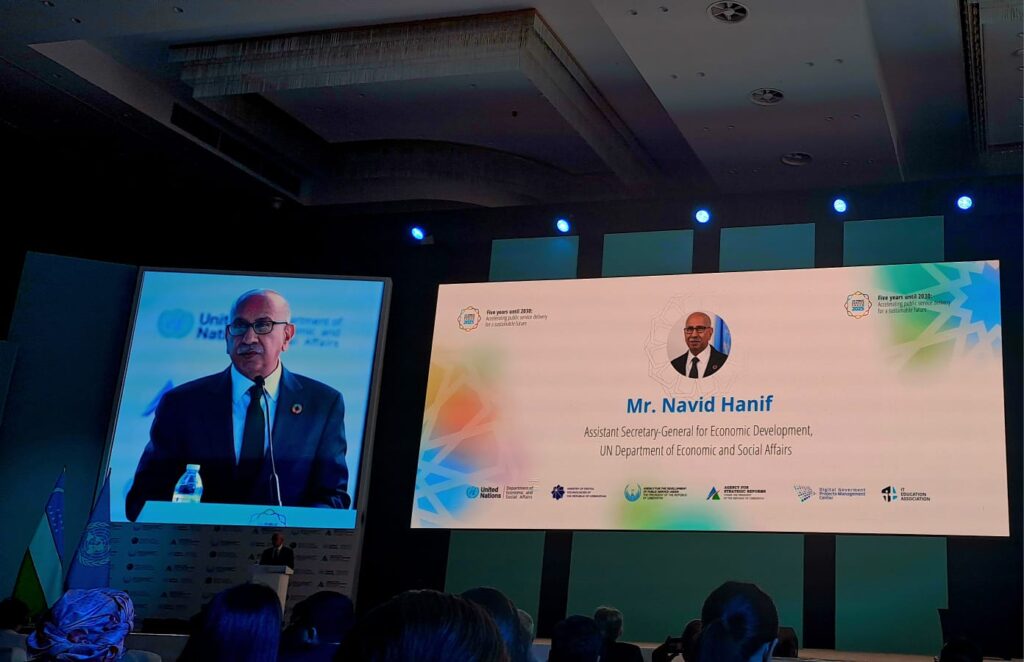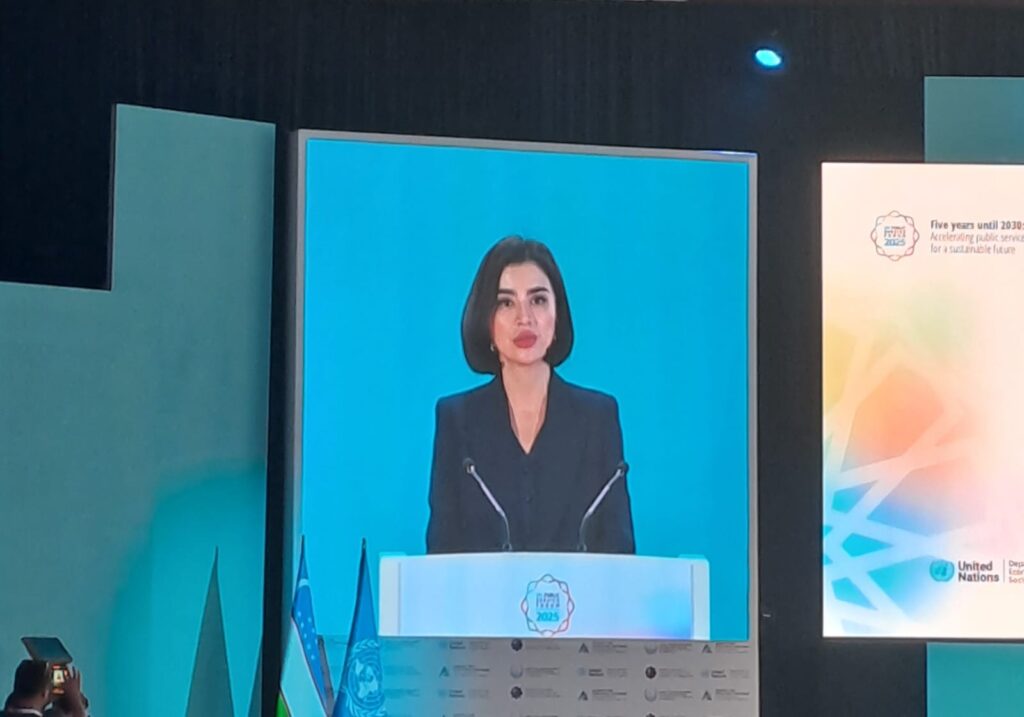UN Public Service Forum 2025 – Bridging the Divide: Delivering on the Promise of Digital Governance

The opening ceremony of the UN Public Service Forum 2025 took place on June 23rd—United Nations Public Service Day—in Samarkand, Uzbekistan. The event commenced with an address from the President of the Republic of Uzbekistan, delivered by the Presidential Advisor, Ms. Saida Mirziyoyeva. It was followed by remarks from Mr. Navid Hanif, Assistant Secretary-General for Economic Development at the UN Department of Economic and Social Affairs.
His Excellency Mr. Fadil Bin Yusof, Deputy Prime Minister of Malaysia, then delivered a keynote speech. He was followed by Mr. Sherzod Shermatov, National Chief Information Officer and Minister of Digital Technologies of the Republic of Uzbekistan. Mr. Shermatov announced the Samarkand Ministerial Declaration on advancing digital transformation, innovation, and robust data governance in public service. He outlined seven priority areas:
- Digital transformation of public services
- Innovation and emerging technologies
- Robust data governance
- Inclusion and equity
- Cybersecurity and digital rights
- Climate action and sustainability
- Global cooperation
The ceremony warmly welcomed over 400 delegates from around the world to Samarkand, the historic “City of Knowledge.” Highlights included Uzbekistan’s recent achievements in digital transformation and public sector modernization.
In the face of unprecedented global challenges, speakers emphasized the urgent need for smarter governance, AI readiness in digital initiatives, and the development of innovation clusters to build modern, resilient civil services. A key takeaway was the call to move beyond promises—urging governments and institutions to effectively implement their commitments and create performance-driven, high-impact societies.

Ministerial round table – The Spirit of Samarkand: Innovation, Inclusion, and Cooperation in Public Service
Following the opening ceremony of the UN Public Service Forum 2025 in Samarkand, a ministerial roundtable brought together representatives from a wide range of countries to share experiences, ideas, and strategies related to digital transformation in the public sector. The discussion provided a dynamic platform for dialogue on the use of emerging technologies, particularly artificial intelligence, to enhance public services and governance.
Uzbekistan, the host country, presented its ambitious agenda to become a regional IT hub, underpinned by the goal of exporting its own digital public services and technological innovations. The country has begun integrating AI tools into public administration, including voice assistants, biometric payment systems, AI-driven tax support, and tools for analyzing legal data. Uzbekistan’s broader digital vision includes fostering a vibrant startup ecosystem across fintech, govtech, and edtech sectors, backed by the emergence of two unicorn companies and the launch of 14 new venture funds. The government is also investing heavily in digital talent, with a national target to train one million coders and one million AI prompters. This commitment to education and digital literacy is reflected in Uzbekistan’s global ranking as the leading country for online learners relative to the labor force, according to Coursera. In 2026, Uzbekistan will also host the International Olympiads in Informatics, further cementing its role as a center of digital excellence.
Participants at the roundtable emphasized that digital transformation must be inclusive and people-centered. True leadership, it was noted, lies not in showcasing technology for its own sake, but in removing barriers and enabling citizens to shape their own futures. The session served as a call to action: the ideas and solutions shared in Samarkand should not remain theoretical but be taken back home and implemented. Delegates were reminded that innovation does not always require reinventing the wheel, but often involves adapting and building upon successful models.
Throughout the discussion, various countries, and many African countries presented their national strategic initiatives. Her Excellency Ms. Mercy Maruva Dinha, Deputy Minister of Public Service of Zimbabwe, highlighted the country’s efforts to empower women and youth through innovation, including the creation of university-based innovation hubs that encourage student-led projects and bridge the gap between academia and industry. The country also promotes project-based learning in schools, fostering critical thinking. The government is working to expand internet access in rural areas and close gender and geographic digital divides through initiatives like e-recruitment centers and information hubs.
Taking the mic, his Excellency Mr. Kassim Haroun Ali, Minister of Decentralization of Djibouti, reminded the crowd that Djibouti is a young democracy with modest resources, and emphasized its political commitment to digital transformation. The country has developed a national roadmap to guide the modernization of its public services, with the aim of becoming a “smart nation” marked by transparency, performance, and citizen engagement. A key milestone has been the establishment of a biometric national registry, enabling more efficient information exchange between sectors such as security, justice, taxation, healthcare, and education.

His Excellency Mr. Fassoun Coulibaly, Minister of Public Service and Administrative Reforms of Mali outlined the country’s national digital economy policy, launched in 2020, and a broader strategy to modernize public administration by reducing in-person interactions for routine services. Online tax declarations and payments, a land registry platform that cuts processing time from two years to six months, and interconnected HR systems for government departments are among the key achievements. A five-year national training plan for public officials and the creation of AI and robotics centers in universities further support the country’s digital transformation. Mali also underscored its commitment to accountability through a national transparency policy.
Through the intervention of His Excellency Mr. Salamaan Jacobs, Chairperson of th Civil Service Commission of Namibia, he highlighted the challenge of delivering services across its vast and sparsely populated territory. Despite these challenges, the country has held transparent elections and launched comprehensive social protection initiatives for youth and the elderly. It has also prioritized food security and poverty eradication, not through a single ministry, but by integrating this focus across all sectors. Education remains free, and all ministries are encouraged to consider how their policies can contribute to reducing poverty.
The Minister of Public Service of Senegal, Mr. Oliver Boucal, also shared Senegal’s concrete implementation of new digital initiative: indeed, it has adopted a national strategy for equity and equality, with a strong emphasis on equal access to public services. The Ministry has launched a range of initiatives, including the promotion of women’s leadership, aimed at enabling women to hold strategic positions in the public sector.

Some of the other ministerial interventions included shared experiences on digital transformation implementations, concrete examples and specific results, as well as the future programs and projects to be launched. His Excellency Mr. Francis Motchi Belande Sade, Minister of Public Administration of the Solomon Islands shared the country’s strategy for sustainable innovation in the public sector, focusing on improving service delivery through digital finance and human resource systems that enhance transparency and accountability. Tools to monitor digital progress across ministries and efforts to build communication capacity were central to their approach.
His Excellency Mr. Paata Salia, Minister of Justice of Georgia, the next host of the Forum, presented forward-looking reforms that center on open data and digital citizenship under the principle of “leave no one behind.” The country has created inclusive digital service points, even within prisons, to ensure equal access. Georgia’s legal and institutional framework supports long-term digital sustainability, with a dedicated Digital Government Agency tasked with implementation.
The Azerbaijan Deputy Chairman of the State Agency for Public Service and Social Innovation, Mr. Jeyhun Salmanov, shared its emphasis on collaborative partnerships, introducing the “4P” model—public, private, people, and international partnerships—to scale public sector innovation. Senegal, meanwhile, placed gender equality at the center of its public service strategy, advancing a national framework to promote equity and launching programs that support women’s leadership in key administrative roles.
The session closed on a reflective and aspirational note, with a call to embrace what was termed “the Spirit of Samarkand.” This spirit urges governments to push the boundaries of knowledge, remain open to diverse cultures and approaches, and foster cooperation as a foundation for meaningful progress. With nearly one-third of the global population still lacking internet access speakers emphasized that the urgency to act has never been greater.





